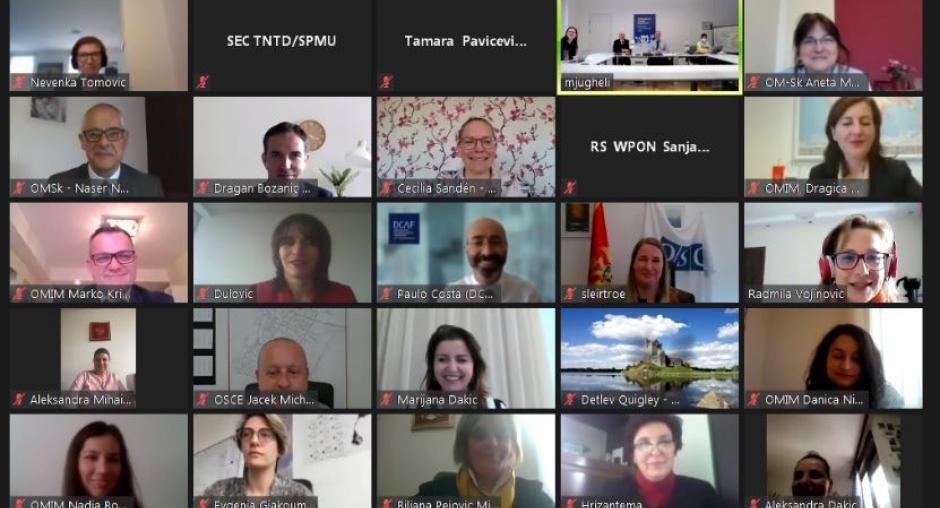OSCE concludes pilot project in Montenegro on how to increase and support the participation of women at all levels of policing

PODGORICA/VIENNA, 10 March – Increased participation of women in the police sector contributes to enhancing public confidence in the police. This was the conclusion of an online event of the OSCE project “Increasing and Supporting the Participation of Women at all Levels of Policing” held on 10 March 2021.
The final event of the project, piloted in Montenegro between July 2020 and February 2021, brought together 67 participants from Montenegro and regional and international organizations to assess the status of women’s participation in the Montenegrin Police and share experiences of female and male police officers in various levels of seniority. The study includes concrete and tailored recommendations to assist Montenegro in further advancing the participation of women at all levels of policing.
Opening the event, Alena Kupchyna, Co-ordinator of Activities to Address Transnational Threats at the OSCE Secretariat, said that the event is a milestone in the common efforts to enhance the participation of women – in societies and law enforcement. “We are here today because we want to accelerate the change, to make concrete progress and to be champions for equal participation of women and men in society as a whole. It is crucial that the police staff mirrors as much as possible the communities they serve.”
Sergej Sekulović, Minister of Interior in the Government of Montenegro, said that the project offers a roadmap for the Ministry and the Police Directorate, as well as for all other relevant social actors. “The percentage of women in the Police Directorate is not at a satisfactory level, especially in managerial positions and in the operational staff. The statistics show that only 15.9 per cent of women are among police officers, while 84.1 per cent are men. This fact is based on the patriarchal patterns of Montenegrin society, and should be addressed through a multidisciplinary approach.”
Maria Gratschew, Counsellor in the Swedish OSCE 2021 Chairpersonship, said that supporting police development and reform, which includes building police-public partnership, creating multi-ethnic police services, and promoting gender mainstreaming, are among the key elements in the OSCE’s present mandate and priorities of policing.
Luca Zelioli, Ambassador of Italy to Montenegro, stated that by implementing recommendations within this OSCE study, Montenegro could become a leading example in gender equality among law enforcement services in the Western Balkans. “This would represent a major step forward not only for the Police Directorate, but also for the entire Montenegrin society, helping to break traditional patterns that, unfortunately, continue to obstruct female contribution in so many fields.”
Boris Gandel, Ambassador of Slovakia to Montenegro said that comprehensive security could only be achieved if everyone in our populations is included. “The meaningful inclusion of women in all spheres of public and private life is vital to the security and development of societies.”
Thanking the Montenegrin authorities for volunteering as the pilot site for this project, Siv-Katrine Leirtroe, Deputy Head of the OSCE Mission to Montenegro, said research shows that the professionalism of the police improves with increased participation of women police officers, along with the quality of services they provide to the public. “Women bring a positive impact on law enforcement practices and women officers help improve police-community relations.”
During the event, the OSCE Mission to Montenegro presented six public information campaign videos promoting women as police officers, with the slogan, “We are the power of the team — For more women in policing.” This campaign will be launched in Montenegro this spring.
The project was led by the Strategic Police Matters Unit of the OSCE Secretariat’s Transnational Threats Department and implemented in co-operation with the OSCE Mission to Montenegro, with financial support from the governments of Italy and Slovakia.
